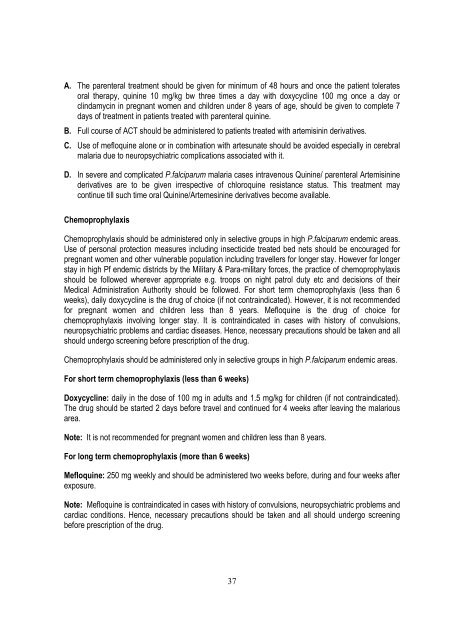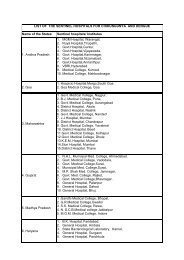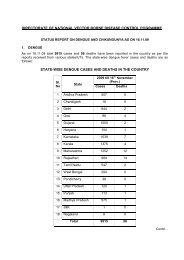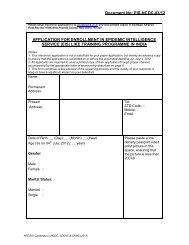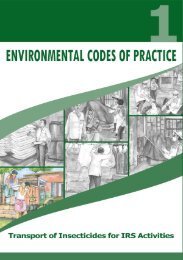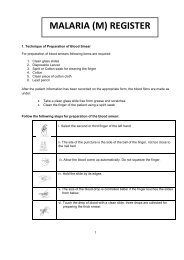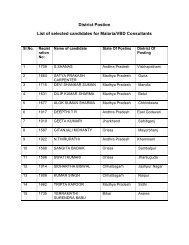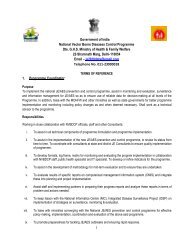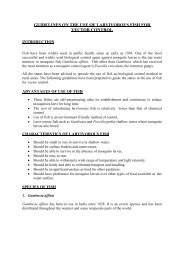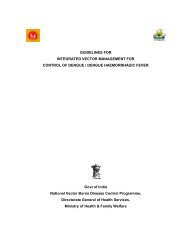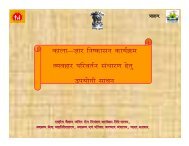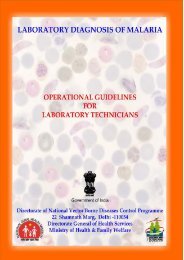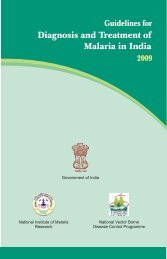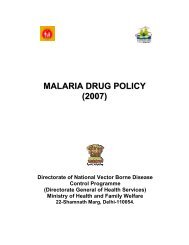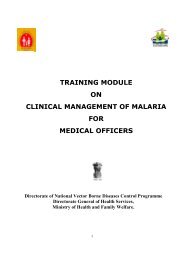training module for medical officers primary health centre - NVBDCP
training module for medical officers primary health centre - NVBDCP
training module for medical officers primary health centre - NVBDCP
- No tags were found...
Create successful ePaper yourself
Turn your PDF publications into a flip-book with our unique Google optimized e-Paper software.
A. The parenteral treatment should be given <strong>for</strong> minimum of 48 hours and once the patient toleratesoral therapy, quinine 10 mg/kg bw three times a day with doxycycline 100 mg once a day orclindamycin in pregnant women and children under 8 years of age, should be given to complete 7days of treatment in patients treated with parenteral quinine.B. Full course of ACT should be administered to patients treated with artemisinin derivatives.C. Use of mefloquine alone or in combination with artesunate should be avoided especially in cerebralmalaria due to neuropsychiatric complications associated with it.D. In severe and complicated P.falciparum malaria cases intravenous Quinine/ parenteral Artemisininederivatives are to be given irrespective of chloroquine resistance status. This treatment maycontinue till such time oral Quinine/Artemesinine derivatives become available.ChemoprophylaxisChemoprophylaxis should be administered only in selective groups in high P.falciparum endemic areas.Use of personal protection measures including insecticide treated bed nets should be encouraged <strong>for</strong>pregnant women and other vulnerable population including travellers <strong>for</strong> longer stay. However <strong>for</strong> longerstay in high Pf endemic districts by the Military & Para-military <strong>for</strong>ces, the practice of chemoprophylaxisshould be followed wherever appropriate e.g. troops on night patrol duty etc and decisions of theirMedical Administration Authority should be followed. For short term chemoprophylaxis (less than 6weeks), daily doxycycline is the drug of choice (if not contraindicated). However, it is not recommended<strong>for</strong> pregnant women and children less than 8 years. Mefloquine is the drug of choice <strong>for</strong>chemoprophylaxis involving longer stay. It is contraindicated in cases with history of convulsions,neuropsychiatric problems and cardiac diseases. Hence, necessary precautions should be taken and allshould undergo screening be<strong>for</strong>e prescription of the drug.Chemoprophylaxis should be administered only in selective groups in high P.falciparum endemic areas.For short term chemoprophylaxis (less than 6 weeks)Doxycycline: daily in the dose of 100 mg in adults and 1.5 mg/kg <strong>for</strong> children (if not contraindicated).The drug should be started 2 days be<strong>for</strong>e travel and continued <strong>for</strong> 4 weeks after leaving the malariousarea.Note: It is not recommended <strong>for</strong> pregnant women and children less than 8 years.For long term chemoprophylaxis (more than 6 weeks)Mefloquine: 250 mg weekly and should be administered two weeks be<strong>for</strong>e, during and four weeks afterexposure.Note: Mefloquine is contraindicated in cases with history of convulsions, neuropsychiatric problems andcardiac conditions. Hence, necessary precautions should be taken and all should undergo screeningbe<strong>for</strong>e prescription of the drug.37


